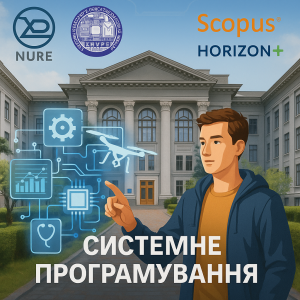 | Choose a future that works for you! Specialists are trained at the Department of Electronic Computing of the Kharkiv National University of Radio Electronics. The Department cooperates with universities in Spain, France, Germany, Slovakia, Lithuania, Latvia, Poland and other European countries, which gives applicants the opportunity to:
|
Study and work at the same time
The master’s program is adapted to the realities of modern life – you can combine study with work in your specialty. A flexible schedule and practice-oriented tasks allow you not to choose between a career and education – development is carried out in two directions simultaneously.
The educational and scientific program “System Programming” is not just about codes – it is about creating smart software and hardware systems, optimizing computer networks, system software and drivers, IoT and cyber-physical systems.
A feature of the program is the integration of knowledge from promising areas of computer engineering, in particular, modern methods of analysis and synthesis of modern computer systems and networks in the field of designing software and hardware systems for information processing and control.
Idea – startup, science – project!
An ambitious idea or an interesting technical solution will have real opportunities for development, because you have the opportunity to:
- work as part of scientific teams;
- participate in grant-funded interdisciplinary scientific, scientific and applied projects in the areas of MilTech (military technologies), MedTech (medical technologies), GreenTech / EcoTech (green technologies), EdTech (educational technologies), Smart City, AssistiveTech (technologies for people with disabilities);
- present your solutions at startup competitions and hackathons;
- improve communication in English by speaking at scientific conferences and publishing articles.
By studying at the ONP “System Programming”, you will acquire integral competencies to solve complex specialized tasks and practical problems characterized by complexity and uncertainty of conditions, during professional activities in the field of information technologies or in the process of education and scientific research.
We teach:
- Think like an analytical engineer and create complex technical solutions:
- find, analyze and critically evaluate data from various sources;
- formulate engineering and research problems, choose effective ways to solve them;
- choose effective methods for solving complex computer engineering problems, critically evaluate the results obtained and justify the decisions made;
- use methods of analysis, identification and synthesis of computer systems and networks, cyber-physical systems, Internet of Things tools and IT infrastructures;
- develop software components of operating systems, utilities and drivers for computer systems (including embedded ones), Internet of Things and IT infrastructures.
- Model and research:
- build models of computer systems and test their effectiveness in various scenarios;
- use simulation, mathematical and parallel modeling to test hypotheses;
- work with modern conceptual approaches at the interface of IT, engineering and science.
- Work in large projects and teams:
- participate in interdisciplinary projects taking into account technical, legal and social aspects;
- assess risks, make effective decisions and propose optimal alternatives.
- Communicate effectively:
- write technical documentation, prepare presentations and scientific articles;
- deliver reports at conferences and work effectively in a team;
- communicate freely with specialists and non-specialists in Ukrainian and foreign languages.
- Engage in research and innovation:
- plan and conduct scientific research in the field of computer engineering;
- test hypotheses, analyze results and justify conclusions;
- create new architectures and software and hardware solutions that meet the challenges of today
Experience is power!
After graduation, you will be able to continue your scientific career in postgraduate studies in an interesting and useful direction.
Do you want to be among those who create not just code, but the future? Then come to us!
